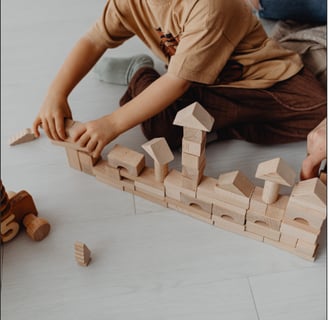The Neuroscience of Parenting
How Your Love and Actions Shape Your Child’s Brain
11/13/20245 min read


The Neuroscience of Parenting
INTRODUCTION
Parenting often feels like a whirlwind of tasks, emotions, and decisions. Amidst the daily routines of meals, playtime, and bedtime, it’s easy to feel like you’re just keeping up. But the truth is, every small moment—every hug, every smile, every word of encouragement—is actively shaping your child’s brain in profound ways. Modern neuroscience has illuminated just how powerful these simple, everyday interactions are, revealing that the love, guidance, and patience you show your child today can set the course for their entire future.
From the moment they’re born, a child’s brain is in rapid development, building trillions of connections that will determine how they think, feel, and interact with the world. These formative years are when you, as a parent, have a unique opportunity to make an impact that will last a lifetime. When you hold your child close, you’re nurturing their sense of security and trust. When you respond to their frustrations calmly, you’re teaching them resilience and emotional regulation. And when you encourage their efforts, even if they stumble, you’re helping to foster confidence and a love of learning.
This journey of “brain-building” doesn’t require any special equipment or complicated strategies. It’s the simple acts of connection, consistency, and empathy that carry the most weight. As you respond to their cries, offer them a comforting touch, or gently guide them through difficult emotions, you’re creating neural pathways that help them develop into emotionally healthy, resilient individuals.
In this guide, we’ll explore the neuroscience behind some of the key parenting actions that support brain development, and share practical insights on how to nurture these aspects in your child’s day-to-day life. From creating safety and stability through routines, to teaching empathy and managing stress, each of these areas highlights the vital role you play in your child’s brain growth. With science-backed strategies, you’ll learn how your love and actions help shape their brain—and lay the groundwork for their future happiness, emotional resilience, and success.
1. The Power of Connection: Creating Safety and Security
How Love and Comfort Foster Emotional Resilience
From the very beginning, your touch, tone, and attention help create a sense of safety for your child. Each time you respond to their cries, hold them when they’re upset, or simply make eye contact, you’re helping their brain feel secure. This bond is the foundation for emotional resilience, teaching them that they can trust and feel safe in the world.
2. Kids Learn by Watching: You Are Their Role Model
Imitation as the Brain’s First Classroom
Your child watches everything you do, even more closely than they listen to what you say. Neuroscience tells us that children learn emotional regulation and social behavior by observing their caregivers. When you manage stress calmly or show kindness, your child’s brain takes note, using you as a guide for their own reactions.
3. Praising Effort, Not Just Results: Building Confidence and Motivation
How Acknowledging the Journey Encourages Growth
When your child receives praise for their effort rather than the outcome, their brain releases dopamine, a chemical associated with motivation and happiness. This positive reinforcement teaches them that hard work is valuable and that perseverance can overcome challenges.
4. Managing Stress: Staying Calm Helps Them Cope
Modeling Healthy Stress Management for Lifelong Coping Skills
Children pick up on their caregivers’ stress levels, and excessive stress can impact their brain’s development. By managing your own stress in healthy ways—like taking deep breaths or discussing your feelings calmly—you teach your child that it’s okay to feel stressed and that there are positive ways to manage those emotions.
5. The Importance of Routine: Creating Stability in Their World
Building Security Through Predictability
Children thrive on routine, providing a stable framework for their day. Regular mealtimes, playtimes, and bedtime rituals offer predictability, reducing anxiety and allowing them to focus their energy on learning and growth. Routine helps create a peaceful environment that makes them feel safe and secure.
6. Playtime: Building Brains Through Fun
How Play Shapes Creativity and Social Skills
Play isn’t just for entertainment; it’s essential for brain development. Through play, children learn problem-solving, teamwork, and self-expression. Every block they stack, every picture they draw, and every game they play helps build their cognitive, social, and creative abilities.
7. Teaching Empathy: Helping Them Understand Feelings
Nurturing Emotional Awareness and Compassion
Empathy begins with recognizing emotions. By naming emotions and discussing feelings, you help your child understand and manage their own emotions and consider others’ perspectives. This empathy-building fosters stronger, more meaningful connections with others and is key to emotional intelligence.
8. The Teen Brain: Navigating Change Together
Supporting Growth and Independence
As your child reaches their teenage years, the brain undergoes significant changes, especially in areas tied to decision-making and impulse control. By guiding them with patience and understanding—and allowing room for mistakes—you help them navigate this time of exploration and self-discovery with confidence.
Practical Tips for Parents
Be Consistent: Routines and steady expectations provide security and help your child relax and focus on learning.
Model Positive Behavior: Show your child how to manage emotions, handle stress, and interact kindly with others through your actions.
Praise Effort: Celebrate their hard work, resilience, and growth, helping them value persistence over perfection.
Manage Stress Together: Demonstrate healthy stress-coping methods, like deep breathing or discussing feelings calmly, to teach them resilience.
Play Together: Play builds essential skills. Join in, and let them see your enthusiasm for creativity and problem-solving.
Teach Empathy: Help them identify and understand their own emotions and others’ to foster meaningful connections.
Guide, Don’t Control: As they grow, let them make their own decisions and learn from the outcomes with your gentle support.
In parenting, it’s the small, consistent actions that shape your child’s future happiness and success. Through love, patience, and a strong connection, you’re helping build a foundation of strength, empathy, and resilience that will last a lifetime.










